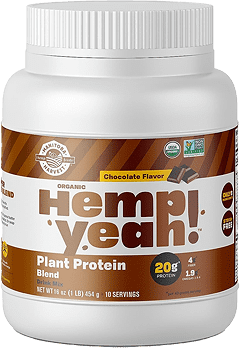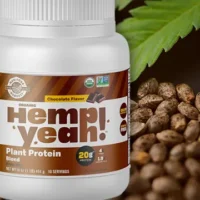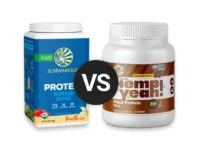Knowledge BaseYou're Questions Answered
What is hemp protein powder?
Hemp protein powder is a plant-based protein supplement made from the seeds of the hemp plant (Cannabis sativa). It is a popular choice among those looking for a vegan, vegetarian, or hypoallergenic protein source. Hemp protein powder is valued for its nutritional content, including its protein, fiber, and essential fatty acids. Below, we explore the characteristics, nutritional profile, benefits, and uses of hemp protein powder.
Characteristics of Hemp Protein Powder
1. Source and Production
Hemp protein powder is derived from the seeds of the hemp plant. The production process involves pressing the seeds to extract the oil, then milling the remaining meal into a fine powder. This powder is rich in protein and retains many of the beneficial nutrients found in the hemp seeds1.
2. Nutritional Profile
Hemp protein powder typically contains around 50-60% protein by weight. It is not considered a complete protein because it is lower in the essential amino acid lysine, but it still offers a broad range of amino acids. In addition to protein, hemp protein powder is a good source of dietary fiber, healthy fats (including omega-3 and omega-6 fatty acids), vitamins, and minerals2.
Benefits of Hemp Protein Powder
1. High in Essential Fatty Acids
Hemp protein powder contains omega-3 and omega-6 fatty acids in a ratio that is considered beneficial for human health. These essential fatty acids play a crucial role in brain function, heart health, and inflammation regulation3.
2. Rich in Fiber
Hemp protein powder is a good source of dietary fiber, which can aid digestion and promote satiety. The fiber content helps support a healthy digestive system and can contribute to regular bowel movements. It also adds bulk to the diet, which can be beneficial for weight management4.
3. Hypoallergenic and Easily Digestible
Hemp protein powder is free from common allergens such as dairy, soy, and gluten, making it a suitable option for those with food allergies or intolerances. It is also easily digestible, meaning it can be absorbed and utilized efficiently by the body without causing gastrointestinal discomfort5.
4. Nutrient-Rich
In addition to protein and healthy fats, hemp protein powder contains various vitamins and minerals, including iron, magnesium, phosphorus, and zinc. These nutrients are essential for maintaining overall health and well-being.
Uses of Hemp Protein Powder
1. Protein Shakes and Smoothies
Hemp protein powder can be easily mixed with water, plant-based milk, or juice to create protein shakes and smoothies. It blends well with various flavors, particularly those that complement its natural, nutty taste.
2. Baking and Cooking
Hemp protein powder can be used in baking recipes, such as protein bars, muffins, pancakes, and cookies, to increase the protein content. It can also be added to soups, sauces, and other savory dishes as a protein and nutrient boost.
3. Meal Replacement
Due to its rich nutrient profile, hemp protein powder can be used as part of a meal replacement shake. It provides a balanced source of protein, healthy fats, fiber, and other essential nutrients, making it a convenient option for those on-the-go.
- Callaway, J. C. (2004). Hempseed as a nutritional resource: An overview. Euphytica, 140(1-2), 65-72.
- House, J. D., Neufeld, J., & Leson, G. (2010). Evaluating the quality of protein from hemp seed (Cannabis sativa L.) products through the use of the protein digestibility-corrected amino acid score method. Journal of Agricultural and Food Chemistry, 58(22), 11801-11807.
- Simopoulos, A. P. (2002). The importance of the ratio of omega-6/omega-3 essential fatty acids. Biomedicine & Pharmacotherapy, 56(8), 365-379.
- Marlett, J. A., McBurney, M. I., & Slavin, J. L. (2002). Position of the American Dietetic Association: health implications of dietary fiber. Journal of the American Dietetic Association, 102(7), 993-1000.
- Vogl, C. R., Hartl, A., & Pöllinger, A. (2004). Hemp seeds (Cannabis sativa L.) as a nutritious and healthy food resource: Nutritional aspects. Journal of Nutritional & Environmental Medicine, 14(4), 359-367.
Related Questions
Related Reviews
Protein vs Protein

Your Answer
We are a participant in the Amazon Services LLC Associates Program, an affiliate advertising program designed to provide a means for us to earn fees by linking to Amazon.com and affiliated sites.




